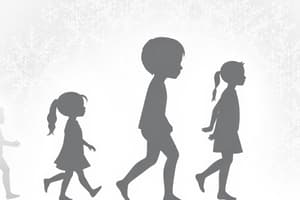Podcast
Questions and Answers
What is the term used to describe the field of study that examines patterns of growth, change, and stability in behavior throughout the entire lifespan?
What is the term used to describe the field of study that examines patterns of growth, change, and stability in behavior throughout the entire lifespan?
- Human development
- Behavioral development
- Lifespan development (correct)
- Cognitive development
Which of the following is NOT a topical area in lifespan development?
Which of the following is NOT a topical area in lifespan development?
- Personality & Social development
- Physiological development
- Economic development (correct)
- Cognitive development
What does physical development in the context of lifespan development primarily involve?
What does physical development in the context of lifespan development primarily involve?
- The development of social skills and relationships.
- The growth and change in learning and problem-solving abilities.
- The changes in the body's physical makeup, including the brain, nervous system, and senses. (correct)
- The formation and development of personality traits.
Which of the following is a distinguishing characteristic of lifespan development?
Which of the following is a distinguishing characteristic of lifespan development?
How do developmental psychologists approach their study?
How do developmental psychologists approach their study?
What is the primary focus of cognitive development?
What is the primary focus of cognitive development?
What is the main emphasis of personality & social development?
What is the main emphasis of personality & social development?
The understanding of human development is important for a range of professionals. Which of the following professions would NOT benefit from an understanding of human development?
The understanding of human development is important for a range of professionals. Which of the following professions would NOT benefit from an understanding of human development?
What is the key characteristic of a critical period?
What is the key characteristic of a critical period?
What is a sensitive period?
What is a sensitive period?
Which of the following is NOT a major theoretical perspective used in lifespan development?
Which of the following is NOT a major theoretical perspective used in lifespan development?
The idea that our genes determine our behavior and personality is associated with which perspective?
The idea that our genes determine our behavior and personality is associated with which perspective?
The 'nurture' perspective suggests that our behavior is primarily shaped by:
The 'nurture' perspective suggests that our behavior is primarily shaped by:
Which theoretical perspective focuses on how our thoughts, feelings, and behaviors are influenced by unconscious drives and early childhood experiences?
Which theoretical perspective focuses on how our thoughts, feelings, and behaviors are influenced by unconscious drives and early childhood experiences?
Which perspective examines how learning through observation and reinforcement shapes our behavior?
Which perspective examines how learning through observation and reinforcement shapes our behavior?
Which perspective explores how our mental processes, such as memory, problem-solving, and language development, influence our behavior?
Which perspective explores how our mental processes, such as memory, problem-solving, and language development, influence our behavior?
Which perspective emphasizes personal growth, free will, and the individual's potential for self-actualization?
Which perspective emphasizes personal growth, free will, and the individual's potential for self-actualization?
Which perspective examines how our behavior and development are shaped by our interactions with the environment, including social and cultural contexts?
Which perspective examines how our behavior and development are shaped by our interactions with the environment, including social and cultural contexts?
Which of the following is NOT a stage in Freud's psychosexual development theory?
Which of the following is NOT a stage in Freud's psychosexual development theory?
According to Freud's theory, which aspect of personality is responsible for moral reasoning and guilt?
According to Freud's theory, which aspect of personality is responsible for moral reasoning and guilt?
Which of the following stages in Erikson's psychosocial theory encompasses the development of trust in caregivers?
Which of the following stages in Erikson's psychosocial theory encompasses the development of trust in caregivers?
What is the primary focus of Erikson's psychosocial theory?
What is the primary focus of Erikson's psychosocial theory?
According to Erikson's theory, what is the central crisis that individuals face during adolescence?
According to Erikson's theory, what is the central crisis that individuals face during adolescence?
Which of the following is NOT a characteristic of Erikson's psychosocial theory?
Which of the following is NOT a characteristic of Erikson's psychosocial theory?
What is the term used to describe a situation where an individual gets stuck in a particular stage of Freud's psychosexual development?
What is the term used to describe a situation where an individual gets stuck in a particular stage of Freud's psychosexual development?
Which stage of Freud's psychosexual development is characterized by a focus on pleasure derived from the genitals?
Which stage of Freud's psychosexual development is characterized by a focus on pleasure derived from the genitals?
What is the main difference between Freud's psychoanalytic theory and Erikson's psychosocial theory?
What is the main difference between Freud's psychoanalytic theory and Erikson's psychosocial theory?
According to the psychodynamic perspective, what motivates human behavior?
According to the psychodynamic perspective, what motivates human behavior?
Which of the following is NOT supported by current research regarding the psychodynamic perspective?
Which of the following is NOT supported by current research regarding the psychodynamic perspective?
Which of these is a key idea of the behavioral perspective?
Which of these is a key idea of the behavioral perspective?
Which of the following is NOT a key type of learning according to the behavioral perspective?
Which of the following is NOT a key type of learning according to the behavioral perspective?
What happens when a behavior is not reinforced or punished, according to the behavioral perspective?
What happens when a behavior is not reinforced or punished, according to the behavioral perspective?
Which of the following perspectives on cognitive development focuses on how individuals take in, use, and store information?
Which of the following perspectives on cognitive development focuses on how individuals take in, use, and store information?
What is the main assumption of the Information-Processing approach in cognitive development?
What is the main assumption of the Information-Processing approach in cognitive development?
Who is credited with developing the theory of Classical Conditioning?
Who is credited with developing the theory of Classical Conditioning?
According to the Cognitive Neuroscience approach to cognitive development, what is the key to understanding cognitive development?
According to the Cognitive Neuroscience approach to cognitive development, what is the key to understanding cognitive development?
Which learning theory emphasizes the role of observation and imitation in learning?
Which learning theory emphasizes the role of observation and imitation in learning?
The cognitive perspective primarily focuses on which aspect of development?
The cognitive perspective primarily focuses on which aspect of development?
Which perspective suggests that a child's understanding of 'birds' can be represented as a schema involving wings, feathers, and flight?
Which perspective suggests that a child's understanding of 'birds' can be represented as a schema involving wings, feathers, and flight?
Which of the following is NOT a criticism of the Information-Processing approach to cognitive development?
Which of the following is NOT a criticism of the Information-Processing approach to cognitive development?
Who is the famous psychologist associated with Cognitive Developmental Theories?
Who is the famous psychologist associated with Cognitive Developmental Theories?
According to the information provided, what is a limitation of the psychodynamic perspective?
According to the information provided, what is a limitation of the psychodynamic perspective?
Which perspective emphasizes the idea that individuals have the capacity to make choices and control their behavior?
Which perspective emphasizes the idea that individuals have the capacity to make choices and control their behavior?
Which of these is a criticism of Erikson's theory of psychosocial development?
Which of these is a criticism of Erikson's theory of psychosocial development?
Which of the following perspectives does NOT have a strong foundation for explaining lifespan development?
Which of the following perspectives does NOT have a strong foundation for explaining lifespan development?
Flashcards
Development
Development
Refers to change over time throughout life.
Lifespan Development
Lifespan Development
Field of study examining growth patterns, change, and stability throughout life.
Universal Principles of Development
Universal Principles of Development
General rules that apply to all individuals during development.
Cultural Differences in Development
Cultural Differences in Development
Signup and view all the flashcards
Individual Traits in Development
Individual Traits in Development
Signup and view all the flashcards
Physical Development
Physical Development
Signup and view all the flashcards
Cognitive Development
Cognitive Development
Signup and view all the flashcards
Personality & Social Development
Personality & Social Development
Signup and view all the flashcards
Critical period
Critical period
Signup and view all the flashcards
Sensitive period
Sensitive period
Signup and view all the flashcards
Nature
Nature
Signup and view all the flashcards
Nurture
Nurture
Signup and view all the flashcards
Theoretical perspectives
Theoretical perspectives
Signup and view all the flashcards
Psychodynamic perspective
Psychodynamic perspective
Signup and view all the flashcards
Behavioral perspective
Behavioral perspective
Signup and view all the flashcards
Cognitive perspective
Cognitive perspective
Signup and view all the flashcards
Humanistic perspective
Humanistic perspective
Signup and view all the flashcards
Evolutionary perspective
Evolutionary perspective
Signup and view all the flashcards
Schemas
Schemas
Signup and view all the flashcards
Assimilation
Assimilation
Signup and view all the flashcards
Accommodation
Accommodation
Signup and view all the flashcards
Information-Processing Approach
Information-Processing Approach
Signup and view all the flashcards
Cognitive Neuroscience
Cognitive Neuroscience
Signup and view all the flashcards
Self-actualization
Self-actualization
Signup and view all the flashcards
Freud's Psychoanalytic Theory
Freud's Psychoanalytic Theory
Signup and view all the flashcards
Id
Id
Signup and view all the flashcards
Ego
Ego
Signup and view all the flashcards
Superego
Superego
Signup and view all the flashcards
Psychosexual Development
Psychosexual Development
Signup and view all the flashcards
Fixation
Fixation
Signup and view all the flashcards
Erikson's Psychosocial Theory
Erikson's Psychosocial Theory
Signup and view all the flashcards
Trust vs. Mistrust
Trust vs. Mistrust
Signup and view all the flashcards
Identity vs. Role Diffusion
Identity vs. Role Diffusion
Signup and view all the flashcards
Despair (Late Adulthood)
Despair (Late Adulthood)
Signup and view all the flashcards
Erikson's Lifelong Development
Erikson's Lifelong Development
Signup and view all the flashcards
Classical Conditioning
Classical Conditioning
Signup and view all the flashcards
Operant Conditioning
Operant Conditioning
Signup and view all the flashcards
Extinction (Behaviorism)
Extinction (Behaviorism)
Signup and view all the flashcards
Social-Cognitive Learning Theory
Social-Cognitive Learning Theory
Signup and view all the flashcards
Piaget's Stages of Cognitive Development
Piaget's Stages of Cognitive Development
Signup and view all the flashcards
Study Notes
Lifespan Development
- Lifespan development refers to changes over time, from birth to death.
- It's a lifelong process.
- Lifespan development examines patterns of growth, change, and stability in behavior throughout life.
Topical Areas in Lifespan Development
- Physical Development: Focuses on the body's physical makeup (brain, nervous system, muscles, senses) and the need for basic necessities (food, drink, sleep).
- Cognitive Development: Explores how learning, memory, problem-solving, and intelligence influence behavior.
- Personality & Social Development: Examines how enduring characteristics differentiate individuals and how social interactions shape relationships throughout life.
Typical Age Ranges
- Prenatal (conception to birth)
- Infancy and toddlerhood (birth to age 3)
- Preschool (ages 3 to 6)
- Middle childhood (ages 6 to 12)
- Adolescence (ages 12 to 20)
- Young adulthood (ages 20 to 40)
- Middle adulthood (ages 40 to 60)
- Late adulthood (age 60 to death)
- These periods are social constructions, culturally defined, and sometimes arbitrary, with individual differences in timing.
Developing with Others in a Social Context
- Cohort: A group of people born around the same time and place.
- Cohorts are influenced by:
- History-graded influences: Events impacting an entire cohort.
- Age-graded influences: Events tied to specific ages.
- Sociocultural-graded influences: Events related to society & culture.
- Non-normative life events: Personal experiences, unexpected or unusual events.
Key Issues and Questions of Developmental Psychology
- There are four main issues. Three are covered:
- Continuous vs. Discontinuous Change: Gradual changes versus distinct stages.
- Critical/Sensitive Periods: Critical periods are specific times with significant consequences, while sensitive periods make an organism more susceptible but less permanent.
- Nature vs. Nurture: The interplay of genetic and environmental factors in development.
Theoretical Perspectives in Developmental Psychology
- Theories explain and predict phenomena, providing frameworks for understanding relationships between concepts.
- There are six major theoretical perspectives:
- Psychodynamic
- Behavioral
- Cognitive
- Humanistic
- Contextual
- Evolutionary
Studying That Suits You
Use AI to generate personalized quizzes and flashcards to suit your learning preferences.




